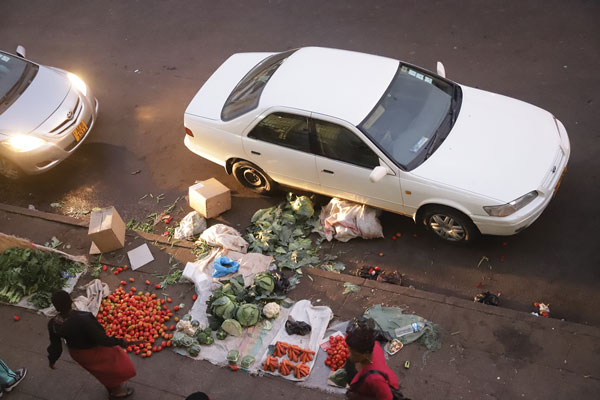
THIS past week, Harare City Council municipal police went about demolishing illegal market stalls, vending sites and workspaces used by vendors and informal traders in the high-density suburbs such as Mbare, Highfields and Glen Norah.
It is not clear whether the demolitions were an enforcement of section 8(1)(l) of Statutory Instrument 77 of 2020, gazetted on March 23, empowering government to “authorise the evacuation, closing, alteration or demolition of any premises whose occupation or use is deemed likely to aid the spread or render more difficult the eradication of COVID-19”.
Nor has it been clarified if this is compliance with the Local Government and National Housing ministry’s April 8 directive to local authorities to implement a Cabinet resolution “to clean up and renovate workspaces used by SMEs and informal traders during the lockdown period”.
Whatever the motivation, the all-important question pertains to whether it is essential or desirable to demolish vendors’ stalls in the midst of an unprecedented crisis already hitting the poor the most.
The impact of the COVID-19-inspired five-week lockdown on the livelihoods of the vendors and informal traders is dire and the demolition of their workspaces will worsen it.
They lost property and stock while the demolitions themselves were characterised by corruption and human rights violations such as extortion, bribes, harassment and assaults.
In an article published in the NewsDay of April 6, two weeks after gazetting of SI 77/2020, I warned about the possibility of the COVID-19 pandemic being abused as a pretext for demolitions.
I also cautioned that this would harm the socio-economic welfare of the already impoverished informal settlement dwellers surviving on vending.
- Chamisa under fire over US$120K donation
- Mavhunga puts DeMbare into Chibuku quarterfinals
- Pension funds bet on Cabora Bassa oilfields
- Councils defy govt fire tender directive
Keep Reading
The demolitions mean that after the lockdown, most informal traders will struggle to restart their businesses, having exhausted capital on lockdown subsistence, and having lost both their wares and workspaces.
It is important for me to emphasise that the organisation that I work for, Community Alliance for Human Settlements in Zimbabwe (CAHSZ), does not encourage illegal occupation of State land for whatever purpose.
CAHSZ strives for proper, orderly and lawful human settlements.
One of our formative goals is to contribute to Zimbabwe’s efforts to achieve sustainable cities and communities aspired under Sustainable Development Goal (SDG) 11.
However, the pursuit of this noble aspiration should not be at the expense of sanctified rights to livelihoods and shelter.
That is why, as CAHSZ, we advocate for relocation as a more humane alternative to forced evictions.
That is also why we advocate for human rights-based approaches that place citizens at the centre of all policies, whether aimed at governing human settlements, achieving sustainable communities or combating the COVID-19 pandemic.
On April 22, 2020, four days after Harare demolitions had begun, UN secretary-general Antonio Guterres gave an update on the COVID-19 global situation.
He called on all responses to ensure protection of livelihoods and to cushion the most vulnerable sections such as informal traders, slum dwellers and internally displaced persons (IDPs).
The demolitions underway in Zimbabwe are a direct opposite of these recommendations.
In fact, they show that we learnt nothing and forgot nothing from Operation Murambatsvina of 2005.
Firstly, Operation Murambatsvina led to loss of livelihoods and shelter by at least 570 000 people.
Likewise, the current demolitions will disrupt jobs and livelihood sources of several thousands of informal traders residing in the same urban and peri-urban informal settlements demolished during Operation Murambatsvina 15 years ago.
Secondly, in 2005, the authorities started by demolishing illegal housing structures before implementing Operation Garikai/Hlalani Kuhle to build houses for those it had rendered homeless.
The victims had to stay in the open while houses were under construction.
This month, the City of Harare demolished vending sites first and then set out to finish construction of designated vending sites for relocation of the affected vendors.
They put the cart before the horse, as affected vendors will be without operating spaces until construction has been finished.
Thirdly, the timing is insensitive.
Operation Murambatsvina was implemented in the middle of winter, exposing women, children, the elderly and persons with disabilities to harsh weather conditions.
Current demolitions are being undertaken amid the COVID-19 pandemic when informal traders who live on a dollar-per-day, hand-to-mouth basis have not been working for a month now due to the lockdown. The big questions are; after the COVID-19 pandemic has been arrested, how do communities recover to become more sustainable and resilient?
How do we ensure that the most vulnerable citizens are not left behind but are in better positions than before the pandemic? Francis Mukora is a certified public policy analyst, human rights campaigner and social justice activist. He writes in his capacity as the research and advocacy coordinator for Community Alliance for Human Settlements in Zimbabwe — an organisation advocating for safe and secure settlements and access to socio-economic rights for all Zimbabweans.











